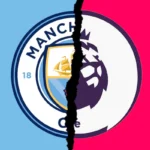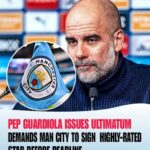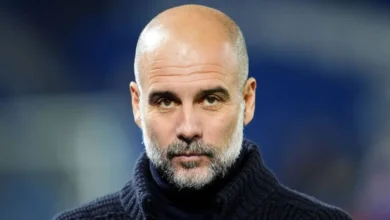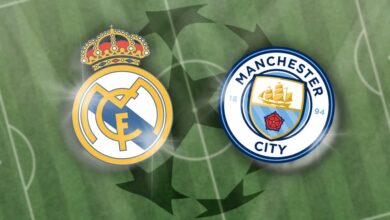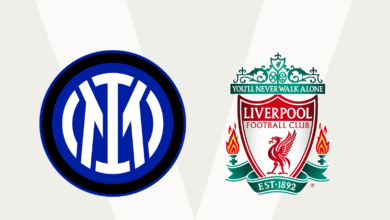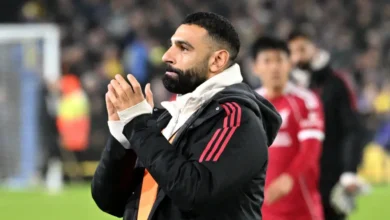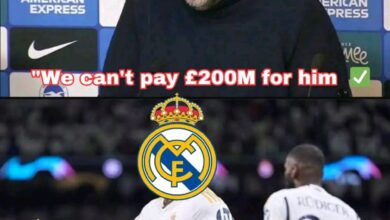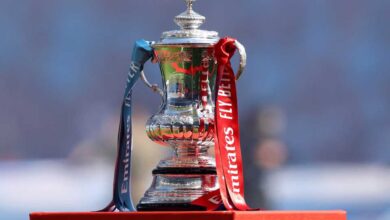Pep Guardiola Fined Himself for Phil Foden Mid-Match Comment
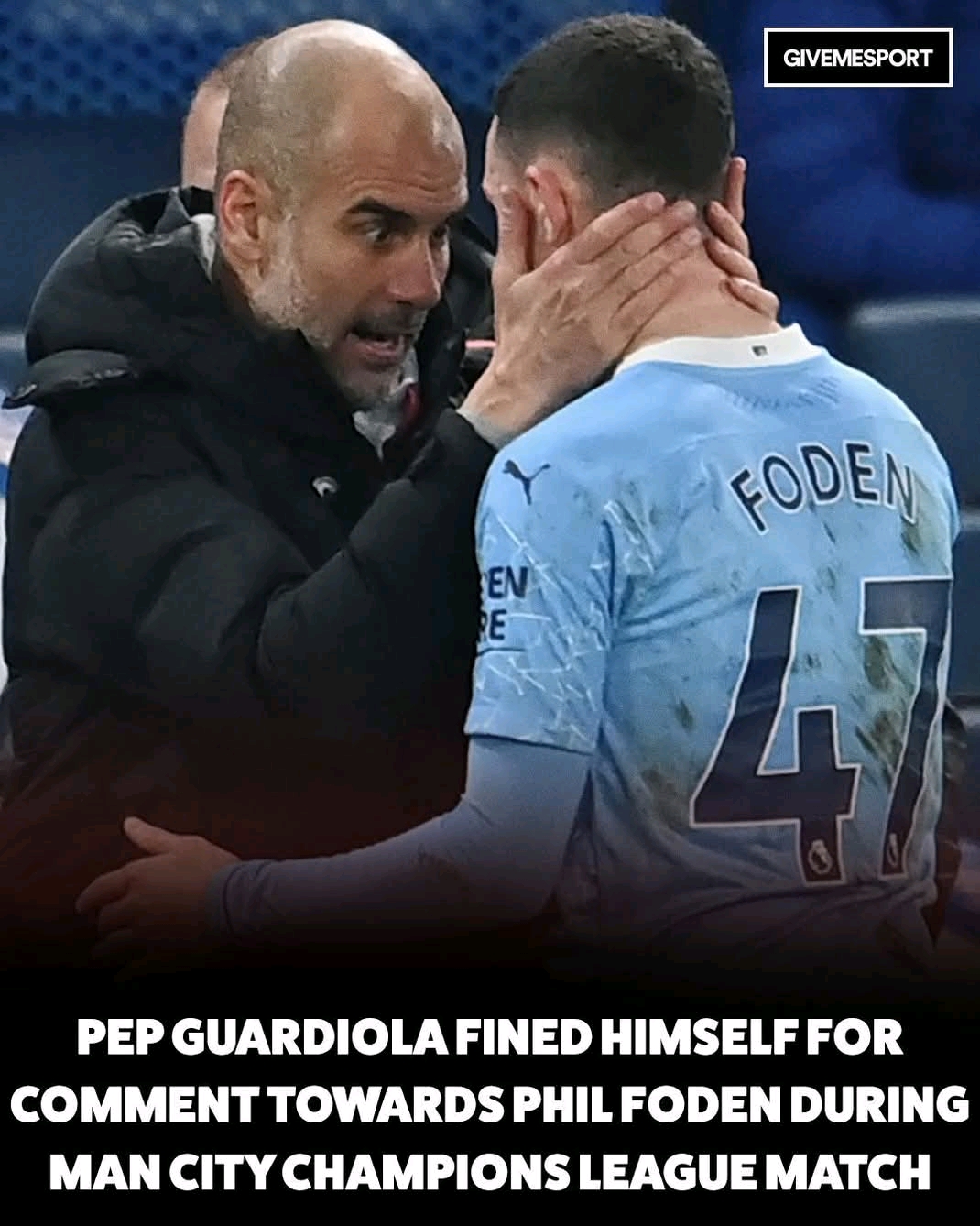
It was supposed to be just another Champions League night for Manchester City, another evening under the lights with Pep Guardiola pacing his technical area and Phil Foden waiting to make his mark. But that game against FC Porto in 2020 became something much bigger. It became a story of pride, courage, anger, and respect — a moment that defined the relationship between one of football’s greatest managers and one of England’s most gifted players.
Phil Foden had grown up dreaming of playing for Manchester City. From the time he was a kid in Stockport, he lived and breathed blue. He used to watch David Silva, Yaya Touré, and Sergio Agüero light up the Etihad. And now, under Pep Guardiola, he was finally part of the story. But on that night against Porto, something happened that tested everything — his patience, his pride, and even his connection with the manager who had made him what he is.
It began with a free-kick. Just a routine moment in the middle of a tense European game. Guardiola had given a clear instruction. He wanted the free-kick taken a certain way, a move straight from the training ground. But Foden saw something else on the pitch, a tiny opening that he believed he could exploit. He went for it his own way. The moment it happened, Pep erupted. Cameras caught him losing his temper on the touchline, screaming, his voice cutting through the empty stadium air
Those words came out like thunder. The entire bench froze. Even the substitutes looked down, pretending not to hear. Guardiola, known for his intensity, couldn’t believe what he had just seen. But it wasn’t just about the free-kick. It was about trust. In that flash of emotion, Pep felt like his young star had ignored him.
Foden, though, wasn’t a boy anymore. He was growing into a man, one who had started to understand his worth. The look in his eyes said it all. He didn’t shout back — not then — but he held it in, burning quietly through the rest of the match.
After the final whistle, he didn’t celebrate. He didn’t smile. He waited. And as the rest of the players filed down the tunnel, Phil stood by the dressing room door, waiting for Pep to walk in. When the manager did, the silence broke.
“Don’t ever do that to me again,” Foden told him firmly. “You wouldn’t do that to other players.”
It was one of those moments that can either destroy a relationship or make it stronger. Nobody talks to Pep Guardiola like that, especially not a 20-year-old academy graduate. But that night, Pep didn’t see arrogance in Foden’s words. He saw courage. He saw backbone. He saw the exact quality he’d been trying to bring out of him since his first day in the senior squad.
Guardiola had always said he wanted his players to think for themselves. He had pushed Foden hard from day one, testing him, sometimes shouting, sometimes freezing him out of games, always wanting to see how much he could take. And here was Foden finally standing up, finally speaking his mind.
The next morning, Pep called the entire team into the meeting room. Nobody knew what to expect. Some players thought Foden would be dropped, maybe even punished. But Guardiola surprised everyone. He stood in front of the group and said he had made a mistake. He admitted that his reaction had gone too far, that his words had crossed a line. And then, in a gesture that stunned everyone, he fined himself.
Yes — Pep Guardiola, the perfectionist, the man who demands control in everything, fined himself. He said no one, not even the manager, should lose control like that. It was a small act, but it meant everything. It showed the entire squad that respect goes both ways.
From that day, the bond between Pep and Foden changed forever. What had started as anger became understanding. What had been tension turned into trust. Guardiola later said privately that was the day Foden became a man. He had finally seen in him the fire that separates good players from great ones.
Foden, on his part, grew stronger. He realized that standing up for himself didn’t mean disrespecting his coach — it meant believing in his own voice. That confidence began to show on the pitch. Every touch, every run, every goal carried something new — a sense of authority. The boy who used to wait for permission now played like someone who knew the game inside out.
People often forget how carefully Guardiola managed Foden’s rise. When fans begged for him to be sent out on loan for more minutes, Pep said no. When critics accused him of slowing down the young Englishman’s growth, Pep smiled and said, “He will stay. He will learn here.” Many didn’t understand. But Guardiola was playing a long game. He wanted Foden to learn from the best, to train with De Bruyne, Silva, and Sterling every day, to absorb their mentality instead of wasting time elsewhere.
And it worked. Slowly, season by season, Foden broke through. In 2019-20, he started becoming a regular. By 2021, he was one of the best in the league. Now, at 25, he is not just a rising star — he is the heart of Manchester City. Six Premier League titles, countless trophies, and performances that make fans stand in awe. But deep inside, he still remembers that day in 2020 when he told his manager, “Don’t ever do that to me again.”
That confrontation became a turning point, not just for Foden, but for Guardiola too. For a man who has coached legends like Messi, Xavi, and Iniesta, Pep realized something that day — sometimes you have to let go of control to truly bring out greatness in others.
He had always believed in emotional intensity. He once said he would rather die on the touchline than manage without passion. But that passion, that fire, can also burn too bright. With Foden, he found balance. He learned that the young Englishman didn’t need to be shouted at anymore. He needed to be trusted.
The following seasons proved it. Whenever City faced tough games, Pep turned to Foden. He became the go-to man in big moments — scoring in derbies, creating magic in Champions League matches, leading when De Bruyne was injured. Guardiola said publicly that Foden could be one of the best players in the world, but privately, he already believed it.
The Porto incident became part of club folklore. Players who were there still talk about it, how they saw a new side of both men that night — Foden’s bravery and Guardiola’s humility. That kind of moment doesn’t happen often in football. Usually, when a young player challenges a coach, he gets punished. But City handled it differently. It became a story of mutual respect.
And the funny thing? Guardiola actually admired Foden more because of it. He saw in him a reflection of himself — stubborn, emotional, obsessed with winning. Pep often says the best players are not the ones who obey every order but the ones who understand why they’re doing something. That night proved Foden had reached that level.
The two now share a silent understanding. On the touchline, Guardiola doesn’t need to shout as much anymore. One look, one gesture, and Foden knows exactly what to do. Their connection is telepathic. The student has become one of the master’s proudest creations.
Looking back, it’s strange to think that a small free-kick could cause such a storm. But in football, the biggest changes often start with the smallest moments. One decision, one argument, one apology — that’s all it takes to transform relationships.
Today, when fans watch Foden glide past defenders or smash in a curling shot from distance, they see confidence. But behind that confidence lies a story of conflict and reconciliation. A story that shows how greatness is never smooth; it’s built through battles — internal and external.
Foden’s journey from a shy academy kid to a world-class player has been full of lessons. Pep once said, “If Phil was Spanish, maybe people would understand how special he is.” But he’s English, and he’s Manchester-born, and that makes his rise even more emotional for the fans. They see themselves in him.
And for Guardiola, who has coached all kinds of football geniuses, Foden is special because he represents everything Pep loves — skill, intelligence, humility, and now, courage. The courage to face your own manager, to speak when something feels wrong, to grow from confrontation instead of hiding from it.
After that game against Porto, Guardiola even joked in training that he had been fined by himself for shouting at “the boss” — a reference to Foden. The whole squad laughed. It showed that what could have been a permanent crack had turned into something beautiful.
Years later, journalists still bring up that story, and Foden smiles when asked. He never denies it. He simply says, “Yeah, that happened. It was a learning moment for both of us.” Guardiola too has spoken about it in interviews, saying that sometimes, emotion takes over, but what matters is what you do afterward.
For Manchester City fans, that story is another reminder of why this era feels different. It’s not just about trophies. It’s about character. About seeing their heroes as human. Guardiola’s willingness to apologize, to fine himself, to admit fault — it showed leadership of the highest kind. And Foden’s bravery showed that even the youngest player can demand respect when he’s earned it.
The Premier League has seen countless manager-player clashes over the years — Mourinho vs. Pogba, Conte vs. Costa, Ferguson vs. Beckham — but few ended with such humility and growth on both sides. This one did. And that’s why it stands out.
As of now, Foden has achieved more at 25 than many do in their whole careers. His market value stands near €100 million, one of the most expensive players in the world. But beyond numbers and trophies, his story with Guardiola is what truly defnes him.
The boy who used to sit quietly on the bench now speaks with his boots. The player who once waited for permission now leads City’s attack. And the manager who once shouted at him now trusts him to deliver without saying a word.
Sometimes football gives us stories that go beyond the pitch — stories about growth, forgiveness, and the fragile balance between control and freedom. That night in 2020 was one of them. A young player stood up to his manager. A manager learned from his mistake. And from that clash, Manchester City became even stronger.
Years from now, when fans talk about Guardiola’s time at City, they will remember Haaland’s goals, De Bruyne’s passes, and the titles. But they will also remember the night Pep fined himself for shouting at Phil Foden — because it showed that even in the heart of perfection, humility still exists.
And maybe, that’s what makes this Manchester City era so powerful. Not just the football. Not just the trophies. But the humanity that runs through it — the lessons that remind us all that greatness is not about never making mistakes. It’s about what you do after you make them.
That night in Porto, when Pep screamed and Foden stood his ground, no one knew it would become a story of respect. But that’s football. It takes anger and turns it into admiration. It takes conflict and turns it into connection. And that’s exactly what happened between Guardiola and Foden.
Now, when Pep watches Foden dominate games, he doesn’t see the kid who once disobeyed him. He sees the man who proved himself worthy. And every fan at the Etihad knows — that moment of fire in 2020 was the spark that lit the torch of a new generation.
The game will move on. Players will come and go. Managers will change. But that one story will always stay — the night Pep Guardiola shouted, Phil Foden answered, and Manchester City became stronger than
